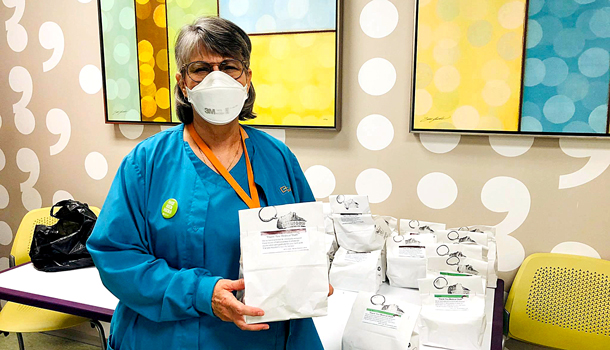
LGBTQ Organizations Adapt to the Pandemic
Local groups emphasize staying safe and helping others.

As the COVID-19 pandemic continues to grow globally, Houston’s LGBTQ organizations are adapting to a new normal as they rise to the challenge and implement creative solutions.
The Montrose Center
Kent Loftin, the Montrose Center’s chief development officer, reports that the Center had transitioned the bulk of their staff to home-based teleservices by March 20. Only 8 or 10 of the Center’s 95 employees still work onsite.

Loftin emphasizes that the Montrose Center is still taking on new clients, and that all application forms are available online. “We want people to know we are here for them,” Loftin says.
The Center’s therapists are now using secure telemedicine software that allows them to meet with their clients through cellphone and laptop computer connections. Support groups are also utilizing online meeting apps.
For any clients who do have to visit the Center, temperature checks are made before they come in. Those folks must also stand 6 feet apart.
Loftin notes that the Center has seen spikes in requests for housing assistance and mental-health support. Domestic-violence reports were four times higher in April.
Although the Center’s large conference rooms are currently closed, three small office rooms are available for clients that do not have online meeting technology. Those clients conduct private appointments using equipment supplied by the Center to conduct their appointments, and the rooms are disinfected after each use.
Additionally, the Center is working to provide food for those in need. The Montrose Diner program for LGBTQ seniors is closed, but clients can pick up boxes of shelf-stable food twice a week from the Center. For those without transportation, food is being delivered.
The Center is also continuing their outreach and health-education programs. “We have some very brave souls out there in the field,” Loftin says.
Montrose Grace Place
Courtney Sellers, director of Montrose Grace Place (MGP), says that the homeless teens they serve can no longer meet for the twice-a-week sit-down meals that were a regular staple of the organization.

Teens now call in to reserve a 15-minute time slot to visit MGP. The volunteers wear masks and gloves and form an assembly line to fill a bag for each youth, giving them a boxed dinner, underwear, toiletries, two snack items, a bottle of water, and a $25 Visa gift card.
The boxed dinners are provided by volunteers who cook at home and drop off the food. Montrose Grace Place’s generous volunteers make it possible to hand out nearly 60 boxed dinners on Mondays and Thursdays.
Those who can’t call MGP wait in a line outside the building, standing at least six feet apart. Sellers says that no more than six people are allowed inside at one time—three volunteers and three youth. Many of these young people work in the food-service industry and have either been laid off or had their hours reduced.
MGP has also been impacted financially because they were a designated beneficiary of the annual Bunnies on the Bayou fundraising party that was canceled this year. MGP will become a 2021 beneficiary, but the loss of funds this year means they won’t be able to expand their transportation program that provides bus passes to the youth.
Last month, MGP quickly prepared a client resource sheet that provides the latest information about where to get food, shelter, COVID-19 testing, and emergency funds.
The Visa gift cards have proven to be a good option for the youth, giving them an emergency backup when SNAP food or shelter is not available.
MGP volunteers have made reusable cloth masks for the youth, and the Alley Theatre has also donated a supply of cloth masks.
In mid-April, MGP began sponsoring virtual meetings so that the youth can connect with each other by using the Houseparty app. “We know some of the youth are super-isolated, and we want to help alleviate anxiety,” Sellers says. As far as she knows, none of the MGP youth have tested positive for the virus.
Sellers encourages any homeless youth in need of help to call her at 832-239-0824.
Legacy Community Health
Katy Caldwell, Legacy Community Health’s executive director, says that Legacy has been impacted financially by the pandemic. “The way we can offer medical services is to provide them and charge for them, and many regular clients are not coming in for appointments,” she says. There has also been an influx of new clients who may not have insurance, or whose insurance is precarious because people are being laid off.

Legacy started testing for COVID-19 early on—even before the City of Houston did so. Caldwell says this put a burden on the current staff. Tents were set up outside of multiple Legacy locations to test those who were presenting with symptoms of the virus. “Because we have so many clients who are immunosuppressed from HIV, we needed to keep them safe from contamination,” Caldwell says. The rate of positive COVID-19 test results at the Legacy locations was about 15 percent.
In order to continue providing healthcare services during the pandemic, Legacy has set up telehealth services that allow healthy clients to avoid traveling to a Legacy location. Insurers were denying coverage for telehealth appointments at first, but now they are covering them.
Legacy has nearly 1,200 employees at their locations throughout Houston. About one-third of the staff does administrative work, and they are now working from home. The Zoom app allows them to hold online staff meetings and conferences.
The frontline employees still reporting to work include receptionists, eligibility counselors, doctors, physician assistants, nurses, social workers, facility and security personnel, and some of the technology staff.
Caldwell helped guide Legacy through the worst of the AIDS epidemic in the 1980s and early ’90s, so she admits to having many flashbacks to that era.
Houston GLBT Political Caucus
Mike Webb, president of the Houston GLBT Political Caucus, notes that their first virtual Caucus meeting went live April 1 on Zoom. Nearly 80 people joined that 90-minute meeting, and the Caucus leadership is also using Zoom for internal meetings

The Texas primary runoff election has been pushed from May 26 to July 14. The Caucus is advocating to the governor to conduct the runoffs using mail-in ballots.
The Caucus leadership is currently studying how an endorsement meeting for the November election might be held virtually. Caucus bylaws would have to be updated to change the current “show of hands” voting method.
Neighborhood canvassing for the general election will require members to organize in different ways than they are used to, since block walks will probably not be possible. Webb predicts there will have to be more reliance on direct-mail pieces.
Greater Houston LGBT Chamber of Commerce
Tammi Wallace, Greater Houston LGBT Chamber of Commerce board chair, says that the Chamber moved quickly back in March to get resource information out to members via the Chamber’s website. There are over 150 LGBTQ businesses or corporate sponsors who are members of the organization.

The Chamber is also sending a weekly email to their entire list of over 1,000 people. “Last week, we got info about Harris County loans for small-business owners, and within half an hour we got that information out,” Wallace says. “This was important, because the loans are first come, first served.”
The Chamber then set up a “Chamber Cares” program to match community needs with specific member resources. Through the program, anyone who wants to help can order food from local restaurant and catering businesses and have it delivered to the first-responders of their choice, or to Legacy Community Health and Signature Care emergency rooms.
The program has been so successful that sister chambers of commerce in Austin, San Antonio, and North Texas are now rolling out their own programs based on the Houston model.
The Chamber has already offered online seminars addressing COVID-19 issues, and more are coming up. Wallace notes that the Chamber had been planning to start using Zoom this year, but the pandemic pushed them to do it sooner.
Chamber members miss seeing and sharing with each other, so a new Facebook group has been started and is proving to be a great social outlet for members.
Lesbians Over Age Fifty (LOAF)
LOAF President Roxanne Cherico says that members of this social group are doing okay. The women are contacting each other by phone to make sure that members are well, and no members have currently been identified as COVID-19 patients.

The group’s usual social events, such as their weekly lunch bunch, Saturday-night outings to Neon Boots Dancehall & Saloon, and monthly museum outings, are on hiatus until further notice.
LOAF members are also keeping in touch via a Facebook page, and board members keep in touch by phone, text, and email.
The Krewe of Olympus
Ben and Bill Jones-Walters, 2020 Krewe of Olympus ball captains, report that the social organization has canceled their usual meetings, fundraising events, and happy hours.

Two board meetings and a general meeting have been held using various online platforms, and members have elected a new board so they could start their duties on April 1. The new ball captain, Andy Eversole, has sent out a presentation of the 2021 ball theme to the membership. The group is also deciding how to distribute the charity dollars collected at the Krewe’s 2020 ball. The annual check-distribution event has been canceled, but donations will still be given to the Krewe’s designated charities.
On the social side, Krewe members are keeping in touch via email and Facebook, and as of late April, the group was not aware of any members dealing with a COVID-19 infection.










